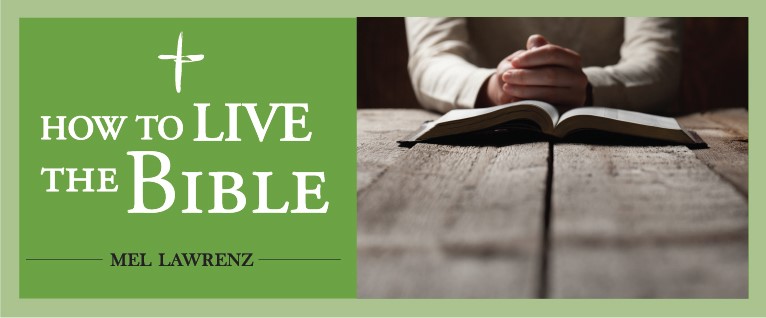
This is the two-hundred-twelfth lesson in author and pastor Mel Lawrenz’ How to Live the Bible series. If you know someone or a group who would like to follow along on this journey through Scripture, they can get more info and sign up to receive these essays via email here.
“I pray that the eyes of your heart may be enlightened in order that you may know the hope to which he has called you, the riches of his glorious inheritance in his holy people, and his incomparably great power for us who believe.” Ephesians 1:18-19

How do we know what to believe?
Now that is an important question. Everything we do in life, every choice we make, every reaction we have to the people in our lives, every opinion we have about how things are going in our communities and our nation, flow out of that structure hidden deep in our minds and hearts: what we believe.
Some of our beliefs are good perceptions of reality, but some are mistakes. Someone once said (and it has been repeated many times): “It doesn’t matter what you believe as long as you are sincere.” What utter nonsense. Of course it matters what we believe. Unfounded beliefs can kill us, literally. Belief is about reality, not about feeling or preference. Sincerity of belief is only as good as the soundness of the belief.
My wife and I used to live in a house right where a state highway made a perfect 90 degree turn. Once in a while, in the middle of the night, we heard the screech of tires and a decisive thump. Then silence. One more driver who believed the road ahead was straight, but discovered the hard truth that there was a 90 degree turn. It didn’t matter that they believed the road was straight. It didn’t matter that their belief was sincere. Ditches have a way of asserting themselves.
Reality rules every time.
Create your own Bible Gateway free personal account and you’ll immediately upgrade your Bible Gateway experience. Do it right now!
Once I was in a conversation with a friend about alien life forms and whether it is possible they have visited Earth. Her comment struck me: “I could believe that.” That was an honest statement. But, of course, the issue is not what we could believe, but what we should believe. The issue is whether there is evidence to believe something is true. Now that takes some work. We have to think. We have to listen to sources of evidence, and before that, judge the reliability of the sources of evidence. Some people don’t want to do that work. They just want to know who to follow, nodding in agreement on every issue.
So let’s break this down. What are the steps each of us should take in deciding what we should believe? There are specific methods for this. Historically proven steps. This applies to whether you are deciding to accept your doctor’s analysis that you have cancer, or what source to turn to for weather forecasts, or whether someone is guilty of a crime. There is a wonderful consistency in the proper steps of seeking truth.
Here is one way of describing that progression.
Step 1. Ask good questions.
Oftentimes in life finding answers is not that difficult. The issue is whether we are asking the right questions.
Here are some good questions:
- How can I be a better person?
- Whom do I know who knows what is right and wrong?
- What does it mean to live a good life?
- What are my core responsibilities as a parent?
- What is the law of the land, and how can I be committed to it?
Here are some inferior questions:
- How can I feel good?
- What’s in it for me?
- How can I avoid people who make me uncomfortable?
- Why are those other people so despicable?
- How can I hoard what I have?
- How can I cheat in order to win?
- Who has raw power and how can I attach myself to them?
Our instincts about what questions to ask in life reveal the disposition of our minds and hearts. Before we go looking for answers, we need to ask ourselves whether we are asking good, life-giving questions.
[to be continued]
___________
___________
[If you believe this series will be helpful, this is the perfect time to forward this to a friend, a group, or a congregation, and tell them they too may sign up for the weekly emails here]
Mel Lawrenz (@MelLawrenz) trains an international network of Christian leaders, ministry pioneers, and thought-leaders. He served as senior pastor of Elmbrook Church in Brookfield, Wisconsin, for ten years and now serves as Elmbrook’s teaching pastor. He has a PhD in the history of Christian thought and is on the adjunct faculty of Trinity International University. Mel’s many books include Spiritual Leadership Today: Having Deep Influence in Every Walk of Life (Zondervan, 2016). See more of Mel’s writing at WordWay.
The post How to Live the Bible — How Do We Know What to Believe? appeared first on Bible Gateway Blog.












